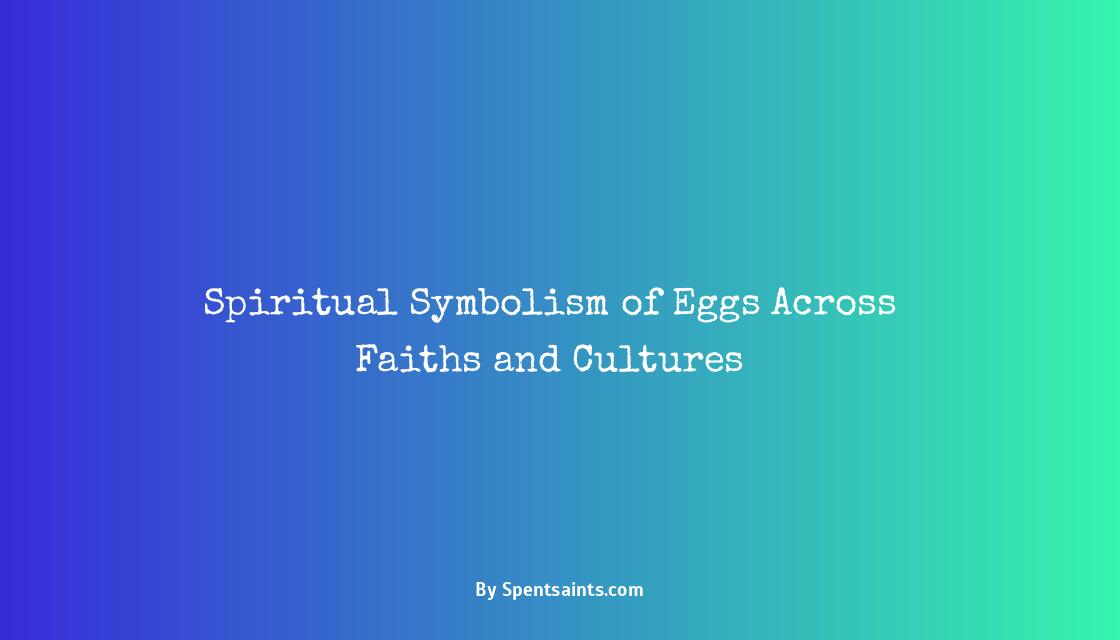Eggs hold a special place in the world’s spiritual traditions. Their symbolic meaning transcends any one faith, resonating with humankind’s shared fascination with nature’s mysteries.
The egg’s smooth oval shape and inner potential for life connect it to themes of fertility, birth, renewal and the continuity of creation. Across cultures and through the ages, eggs came to represent cosmic order, the generative power of the divine feminine, and the promise of rebirth.
The Cosmic Egg in Creation Myths and Sacred Narratives
In many ancient cultures, the egg symbolized the origins of the universe. Hindu scriptures describe the primordial cosmic egg from which the God Brahma emerged to create the heavens and earth. In ancient Greek Orphic texts, the cosmic egg splits into halves forming the sky and earth. Egyptians believed the sun god Ra emerged from an egg laid on the primordial mound by a celestial goose.
These cosmic egg myths connect to philosophical musings about the source of existence. The egg contains within it all the matter and energy to give rise to an ordered cosmos governed by natural laws. As a sealed vessel, the egg also evokes concepts of unity and wholeness before the onset of duality and differentiation.
Cosmic Parallels Across Cultures
The cosmic egg motif parallels many cultures’ creation stories. For the ancient Chinese, Pangu emerged from the cosmic egg and separated yin from yang in the newborn universe. In the Finland epic The Kalevala, a golden egg cracks to form the skies, seas, and earth.
The cosmic egg echoes metaphysical ideas about the universe’s origins and the conditions that precede existence. Containing opposites in harmony within a finite space, the egg evokes a state of balance and limitless potential before creation’s moment.
The Egg Motif in Christianity
Eggs resonate with Easter and themes of resurrection in Christianity. Painting Easter eggs dates back to Mesopotamian times. The hard shell symbolic of Jesus’ sealed tomb from which He rose again. The cracking egg shell evokes Christ bursting from the grave. The egg’s likeness to a rock tomb may have also contributed to its Easter associations.
Mary Magdalene’s encounter with the risen Christ is often depicted with an egg symbol. There is a tradition that eggs turned red when she approached Jesus at His empty tomb, touched by the miraculous resurrection.
Significance of Eggs in Other Faiths
In Judaism, a hard-boiled egg dipped in salt water at Passover represents both sacrifice and springtime renewal. The egg on the Passover Seder plate signifies new beginnings.
In Islam, eggs are sometimes decorated at Nowruz, the Persian New Year marking the Spring Equinox and symbolic rebirth. Traditionally, Iranian families exchanged decorated eggs as gifts.
Pagan Egg Traditions Connecting Fertility, Goddesses and Magic
Since pre-Christian times, eggs have been associated with spring equinox celebrations and fertility rituals across European pagan cultures. Decorating and gifting eggs for Easter and Spring Equinox is likely adapted from these ancient customs.
Ostara, the Germanic Spring Goddess, had a magical egg-laying hare as companion. The hare symbolized fertility and rebirth, while eggs represented Ostara’s powers of renewal after winter’s death.
In Latvia, folk traditions held that the fate of the harvest could be foretold from color patterns on eggs cracked open during spring rites. Eggs were dyed with plant pigments by village maidens as gifts for suitors and family.
Goddess Traditions and Feminine Power
As symbols of fertility and new life, eggs are connected to mother goddesses and feminine generative energy in many pagan traditions. The Druidic goddess Eostre likely derives her name from a Proto-Indo-European root meaning “to be vivid or shining,” associated with dawn light and spring.
Neolithic mother goddess figurines are shaped like eggs, evoking feminine mysteries of creation and birth. In Slavic folklore, the life-giving goddess Lada was symbolized by eggs. The Roman spring goddess Veralna protected the sacred egg oracle.
Alchemical and Magical Properties
Alchemists viewed the egg as the prima materia or first matter from which the alchemical Great Work would bring forth the Philosopher’s Stone. The egg symbolized the chaos from which new existence emerges.
Folk healing practices ascribed eggs with magical as well as spiritual properties. An egg could absorb illness or be given as protection against evil spells. Egg shells were pulverized into healing poultices.
The Enduring Spiritual Resonance of Eggs
From ancient times to the modern day, eggshells have been treasured as vessels imbued with sacred significance. Ostrich eggs with intricate traditional carvings provide a canvas for African tribal spiritual motifs.
Faberge designers created opulent bejeweled Easter eggs for generations of Russian tsars. The rare iconic eggs synthesize extravagance with Easter’s symbolic meanings.
Eggs as Jungian Symbols and Archetypes
In literature and pop culture, eggs still evoke mythical allusions and spiritual mystery. Jungian psychologists analyze oval shapes and eggs as archetypal feminine symbols of potential, new life and wholeness.
As an archetype, the egg represents the self and the psyche’s many layers. The shell is the persona or outer personality. The yolk is the inmost self where the divine dwells. Growth occurs by nurturing the psychic center, just as an egg incubates and hatches.
A familiar and accessible symbol, the egg will likely continue inspiring humankind’s spiritual imagination across faiths, cultures and eras to come. The egg’s seamless blend of outside and inside echoes meditation’s goal of integrating surface and depth.
Perhaps the spiritual egg remains compelling because it mirrors the human condition. We each carry an inner cosmos of thoughts, memories, and unrealized futures. Like the egg, our lives signify hidden wholeness, potential and order, if we choose to nurture them.

Dreams, spirit, growth – I explore them all. Laugh, learn, grow with me. Unlock your inner guru.
